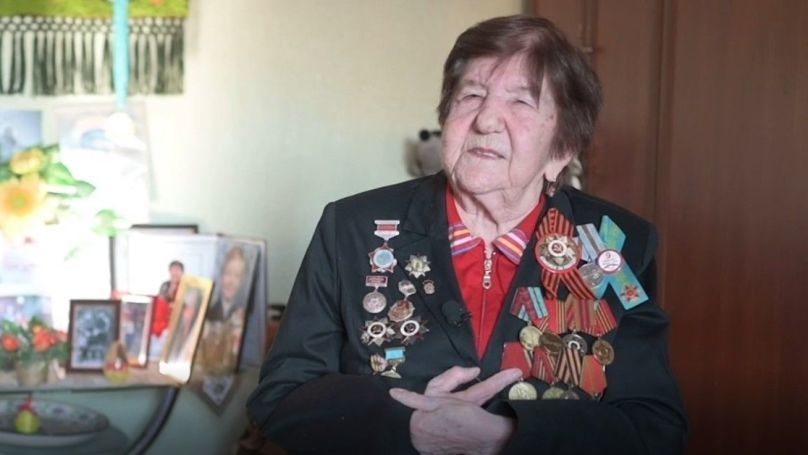Serafima Grigorievna Ponomareva, an MGIMO University student, headed to the front, sang patriotic songs with the troops at the recently-captured Reichstag on Victory Day, and became an interpreter at the Nuremberg Trials at the age of 18. The events of those months remain fresh in her memory despite her being 94 years old. We filmed and recorded Serafima Grigorievna Ponomareva's story. Her version of events is presented without changes, uncut – as she remembered them. Today’s episode is the first in a multimedia series about the Nuremberg Trials interpreter.
The material was prepared by Sputnik Kazakhstan International News Agency in cooperation with the editors of the “Nuremberg: Casus Pacis” project.
‘We Became Servicemen, Little People In a Big World’
Starting at a very young age, Serafima was taught English, German and French by her father, an employee of the Soviet Ministry of Foreign Affairs. She had not yet turned 15 when the war started. Two years after being evacuated to Kazakhstan, she returned to the Soviet capital and entered the Moscow State Institute of International Relations (MGIMO). She was recruited to the front straight from the classroom. In April 1944, Serafima Ponomaryova became a German interpreter at the hospital of the Headquarters of the 1st Belorussian Front under the command of Marshal Zhukov.
“In 1943, we were permitted to return to Moscow, and in June my father told me: 'Enrol at our institute'. It was the Foreign Languages School at 9 Profsoyuznaya Street. The thing was that I already knew foreign languages - English and German. I used to speak these languages at home with my sister. So, there were only seven of us going to the institute – after all, we were at war... We were asked to recite a poem, to read a text – thus I was accepted. One could say, without any exams.
One day, the dean came and told us that interpreters were needed at the front. Our troops were already approaching Berlin, but no one was training interpreters, they simply didn't exist... Two people were sent to the front, including me. I was 17 but I did not have a birth certificate. I was born in 1926, and Stalin ordered not to take those born in 1927, especially girls. And that's when my mother decided to commit forgery. She went to the registry office and made a birth certificate for 1927. But they took me away anyway. At that time, they were forming in Moscow a central [train] hospital of the headquarters, a sorting and evacuation hospital. We were boarded on this [train]-hospital, and we went to the front. We reached Brest... There was nowhere to stay: Brest was destroyed, the Brest Fortress was ruined... From Brest, we travelled to Poland. We passed through Warsaw. I remember that the Vistula River was blood-red: the battles for the liberation of Warsaw had just taken place the previous day. About 600,000 of our soldiers, not Americans, not French – 600,000 of our Soviet soldiers died there, and now the monuments to them are torn down... We stopped in Lodz, then we reached Berlin. There I stayed to serve, received a lieutenant's rank. We became servicemen. Little people in this big, big world, little cogs...
We celebrated Victory Day in Berlin. I remember the night before the 9th of May we were washing our uniforms; we had nothing to wear. And so, on 9 May we woke up, went to the walls of the Reichstag, everyone walked down Unter den Linden Avenue, Karl-Marx-Strasse, all the soldiers and officers who had taken Berlin and survived were gathered at the Brandenburg Gate. Zhukov carried the Victory Banner. We walked through the streets of Berlin and back to the Reichstag, there on the steps Lidia Ruslanova sang Russian, Soviet, and military songs. I have a picture from there.
After the victory, Nikolai Erastovich Berzarin was appointed Commander of Berlin. He was a strong-willed man who took Berlin. There was a lot of work to do: to clean the city, to feed the local population. Children stood in queues for food. We gave out buckwheat porridge in kettles, bread. On 16 June, Berzarin was killed while travelling through the city. Zhukov was in tears at the time.
Our dormitory, the former SS school, was situated in the Karlshorst district on the outskirts of Berlin. This was where our headquarters were located. Meetings were held every day at 9 a.m. At times Zhukov participated in them, sometimes someone substituted for him. We were given assignments. Before going to the Nuremberg Trials, we were sent to work in the camps, there were eight of them.
I travelled as an interpreter; I had stenographers along with me. We were collecting materials for the Nuremberg Trials, but we didn't know at the time that there would be one."
The material was prepared by
Correspondent Ayguzel Kadir,
Cameraman Abzal Kaliyev,
Sputnik Kazakhstan International News Agency;
Editors Irina Kareva and Lesya Orlova, “Nuremberg: Casus Pacis” Project.
























